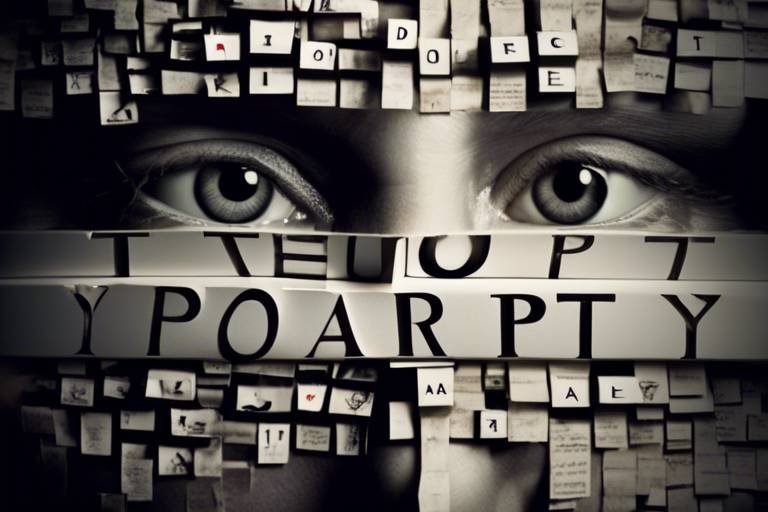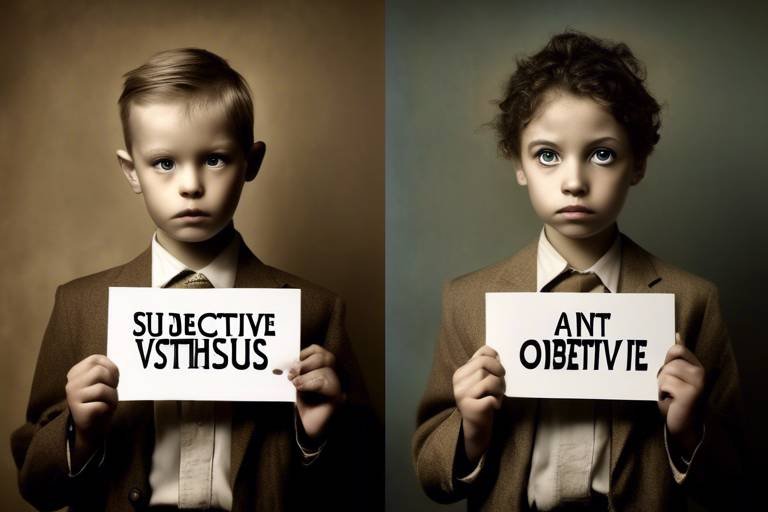Understanding the Ethics of Fan Fiction
Fan fiction is a fascinating and often controversial realm where passion meets creativity. It allows fans to dive deeper into their favorite universes, expanding upon characters and plots in ways that original authors may never have imagined. However, this creative freedom raises a myriad of ethical questions that are essential to consider. How do we balance the love for a story with the rights of its creator? Can fan fiction be considered a legitimate form of artistic expression, or does it tread too closely to infringement? These questions don't just linger in the minds of fans but also resonate within the broader literary community.
At its core, the ethics of fan fiction revolves around the delicate interplay between copyright laws and creative expression. When fans create their own stories using established characters and worlds, they are often walking a tightrope. On one hand, they are celebrating and sharing their love for the original work; on the other, they risk crossing legal boundaries that could lead to disputes with original authors. This tension makes the landscape of fan fiction both thrilling and fraught with potential pitfalls.
Furthermore, the impact of fan fiction extends beyond just the legalities. It fosters a vibrant community of writers and readers who share a common interest, creating a unique cultural phenomenon. This community aspect is crucial; it allows individuals to connect over shared narratives, collaborate on projects, and engage in discussions that enrich their understanding of the original works. However, this communal spirit also raises ethical dilemmas regarding representation and sensitivity in storytelling, particularly when addressing diverse characters and themes.
As we delve deeper into the complexities of fan fiction, it becomes clear that understanding its ethics is not just about legal implications; it’s also about respecting the original works, nurturing creativity, and fostering an inclusive environment for all fans. In the following sections, we will explore these themes further, examining the legal framework, the role of creativity, the impact on original authors, and the ethical considerations that every fan fiction writer should keep in mind.
- Is fan fiction legal? - While fan fiction often exists in a gray area of copyright law, many creators operate under the principle of fair use, provided they do not profit from their works and give credit to the original source.
- Do original authors support fan fiction? - Reactions vary. Some authors embrace fan creations, while others are concerned about the potential infringement on their intellectual property.
- What ethical responsibilities do fan fiction writers have? - Writers should respect the original material, portray characters responsibly, and be mindful of sensitive topics to avoid misrepresentation.

The Legal Framework of Fan Fiction
Understanding the legal implications of fan fiction is crucial for both writers and readers who engage with this unique form of storytelling. At its core, fan fiction involves taking characters, settings, and plots from existing works and creating new stories around them. This practice often walks a fine line between creativity and copyright infringement, making it essential to grasp the legal framework surrounding these creations.
Copyright laws play a significant role in the discussion of fan fiction. In many countries, the original authors hold exclusive rights to their creations, which can include everything from the characters' likenesses to the specific storylines. However, the concept of fair use allows for some leeway. Fair use can permit the creation of fan fiction as long as it meets certain criteria, such as:
- The purpose and character of the use (e.g., whether it’s transformative or commercial).
- The nature of the copyrighted work (e.g., whether it’s factual or creative).
- The amount and substantiality of the portion used.
- The effect of the use on the market for the original work.
For many fan fiction writers, the challenge lies in navigating these legal waters while expressing their creativity. While some creators may feel emboldened by the notion of fair use, others are cautious, fearing potential legal repercussions. It's a bit like walking a tightrope: one misstep could lead to a fall into a legal quagmire.
Moreover, the rights of original authors versus fan creators can create tension. Original authors may feel protective of their intellectual property, worried that fan fiction could dilute their brand or misrepresent their characters. On the other hand, fan creators often argue that their work is a form of homage, celebrating the original material rather than undermining it. This tug-of-war raises questions about ownership and creative expression.
To further complicate matters, the legal landscape is not uniform across different jurisdictions. In some regions, fan fiction is more accepted, while in others, it may be met with strict enforcement of copyright laws. This inconsistency can leave fan fiction writers feeling uncertain, especially when their work gains popularity. A successful fan fiction piece might attract attention, but it can also draw the ire of original authors who may not appreciate their work being interpreted in ways they did not intend.
In summary, while fan fiction can be a vibrant and exciting form of storytelling, it exists within a complex legal framework. Writers must be aware of copyright laws and the implications of fair use while navigating the often murky waters of creativity and ownership. Ultimately, the relationship between original authors and fan creators is one of collaboration and conflict, making it a fascinating topic for discussion within the broader literary community.
- Is fan fiction legal? Yes, fan fiction can be legal under the doctrine of fair use, but it depends on various factors, including the nature and purpose of the work.
- Can authors sue for fan fiction? Yes, authors can take legal action if they believe their copyright has been infringed upon by fan-created works.
- Do authors support fan fiction? Some authors embrace fan fiction as a form of flattery and community engagement, while others may have reservations about it.
- What should I consider when writing fan fiction? Respecting the original work, understanding copyright laws, and being mindful of representation and sensitivity are key considerations.

The Role of Creativity in Fan Fiction
Fan fiction is not just a pastime; it's a vibrant tapestry woven from the threads of imagination, passion, and creativity. For many fans, diving into the world of fan fiction allows them to explore *what if* scenarios, reimagine beloved characters, and even create entirely new narratives that expand on the original works. This creative outlet is akin to a playground where the rules of the original story can be bent, twisted, or even broken, leading to innovative storytelling that can surprise and delight both the writer and the reader.
At its core, fan fiction serves as a unique platform for fans to express their interpretations of characters and plots. Imagine a world where Harry Potter never went to Hogwarts or where Katniss Everdeen chose a different path. These alternative storylines not only provide fresh perspectives but also invite readers to engage with the material in new and exciting ways. The creativity displayed in fan fiction can be astonishing, as writers experiment with various genres, styles, and formats. From dramatic retellings to light-hearted parodies, fan fiction encompasses a wide range of storytelling methods that enrich the literary landscape.
Moreover, fan fiction allows writers to explore complex themes and societal issues that may not have been fully addressed in the original works. Through their narratives, fan fiction authors can tackle topics like identity, love, and morality, often reflecting the diverse experiences of their communities. For instance, a fan fiction piece might delve into the struggles of a character grappling with their sexual identity, providing representation that resonates with readers who see themselves in those stories. This ability to reinterpret and reframe narratives fosters a deeper connection between the fans and the source material, creating a dialogue that transcends traditional storytelling.
In addition to individual creativity, fan fiction also encourages collaboration among writers. Many fan fiction communities thrive on shared ideas, feedback, and support, allowing writers to hone their craft and grow together. This collaborative spirit can lead to the creation of anthologies, crossovers, and even collaborative universes where multiple authors contribute to a single storyline. Such endeavors not only showcase the creativity of individual writers but also highlight the power of community in shaping and enriching the fan fiction landscape.
Ultimately, the role of creativity in fan fiction is multifaceted. It serves as a means of personal expression, a way to engage with beloved characters and stories, and a platform for exploring deeper themes and fostering community. As fans continue to create and share their works, they contribute to a rich and evolving literary tradition that celebrates the boundless possibilities of storytelling.
- What is fan fiction? Fan fiction is a genre of writing where fans create their own stories based on existing characters and narratives from books, movies, TV shows, and other media.
- Is fan fiction legal? The legality of fan fiction is complex and often depends on copyright laws and fair use principles. While some creators embrace it, others may see it as infringement.
- Can fan fiction be published? Generally, fan fiction cannot be published for profit without permission from the original copyright holders, as it often uses protected characters and settings.
- What are the benefits of writing fan fiction? Writing fan fiction allows for creative exploration, community engagement, and the opportunity to develop writing skills in a supportive environment.

The Impact on Original Authors
Original authors often find themselves navigating a complex emotional landscape when it comes to fan fiction. On one hand, the existence of fan-created content can be seen as a double-edged sword. It can provide a unique opportunity for authors to engage with their audience in ways they may not have anticipated. For instance, fan fiction can serve as a form of free promotion, drawing new readers to the original works and expanding their fanbase. Many authors have reported an uptick in book sales or increased interest in their stories after fan fiction has circulated online. This phenomenon can be likened to a viral marketing campaign—one that is organic and driven by passionate fans.
However, the relationship between original authors and fan fiction is not always rosy. Some authors express concerns about their intellectual property rights being compromised. They worry that fan fiction could dilute their original narratives or misrepresent their characters. For instance, if a fan writer takes a beloved character and places them in a situation that contradicts the author's established storyline, it can lead to a sense of frustration or even betrayal. This is particularly true when it comes to sensitive topics or character portrayals that the original author feels strongly about. The emotional investment that authors have in their creations makes the potential for misinterpretation a significant concern.
Moreover, the legal implications of fan fiction can add another layer of complexity. While many authors appreciate the enthusiasm of their fans, they may also feel that their rights are being infringed upon when fan works gain popularity. Some authors have taken a stand against fan fiction, leading to legal actions or public statements that discourage its creation. This reaction can stem from a desire to protect their creative integrity and ensure that their characters and stories remain true to their original vision.
In summary, the impact of fan fiction on original authors is multifaceted. While it can foster a sense of community and promote their work, it also raises significant questions about copyright and creative ownership. Authors must navigate these waters carefully, balancing the benefits of fan engagement with the need to protect their intellectual property.
- What is fan fiction? Fan fiction is a genre of writing where fans create their own stories using characters and settings from existing works, such as books, movies, or TV shows.
- Do authors support fan fiction? Reactions vary; some authors embrace it as a form of flattery and engagement, while others may see it as a threat to their original work.
- Is fan fiction legal? The legality of fan fiction often hinges on copyright laws and fair use, which can vary by jurisdiction.
- How can fan fiction writers respect original works? By maintaining the integrity of characters and storylines and being mindful of sensitive topics, fan fiction writers can honor the original creators.

Positive Reactions from Authors
When it comes to fan fiction, not all authors view this creative offshoot with suspicion or disdain. In fact, many authors embrace fan fiction as a celebration of their work. Imagine pouring your heart and soul into a story, only to see readers not just consume it but also expand upon it, breathe new life into it, and explore avenues you never imagined. This is what fan fiction can do – it can transform a simple narrative into a sprawling universe of possibilities.
Some authors, like Neil Gaiman and J.K. Rowling, have publicly expressed their appreciation for fan fiction. They recognize that fans are not just passive consumers; they are active participants in a larger dialogue about the stories they love. This interaction can create a vibrant community that fosters creativity and encourages new interpretations. For these authors, fan fiction can serve as a powerful endorsement of their work, indicating that their characters and worlds resonate deeply with readers.
Moreover, fan fiction can also provide authors with valuable feedback. Engaging with fan-created content allows writers to see what aspects of their stories resonate most with audiences. They can gauge which characters are beloved, which story arcs are compelling, and even which themes spark conversation. This can be particularly beneficial for authors looking to expand their universes or develop sequels. By observing fan interpretations, they can gain insight into their audience's desires and expectations.
In addition to providing feedback, fan fiction can also serve as a platform for new voices. Many authors have noted that the fan fiction community is incredibly diverse, with writers from various backgrounds contributing their unique perspectives. This infusion of different cultural viewpoints can enrich the original narrative, allowing authors to see their work through a new lens. It’s like looking at a painting from a different angle and discovering colors and details you never noticed before.
Furthermore, some authors actively engage with fan fiction communities, participating in discussions and even promoting fan works. This kind of interaction can cultivate a sense of mutual respect and understanding between authors and fans. It sends a powerful message: that creativity is not a finite resource, and that collaboration—whether direct or indirect—can lead to amazing new stories. For instance, authors might share their favorite fan fiction pieces on social media, highlighting the creativity of their fans and encouraging others to explore the fan-created content.
In summary, while the relationship between authors and fan fiction can be complex, many writers find joy and inspiration in the works created by their fans. The positive reactions from authors demonstrate that fan fiction is not merely an act of imitation; it is a form of homage that can lead to a richer, more interconnected literary landscape.
- What is fan fiction? Fan fiction is a genre of writing where fans create stories based on existing characters and worlds from books, movies, games, and other media.
- Are authors okay with fan fiction? Reactions vary; while some authors embrace it as a compliment, others may have concerns regarding copyright and creative ownership.
- Can fan fiction be published? Generally, fan fiction is published online for free, but publishing for profit can lead to legal issues unless permission is granted by the original author.
- What are the benefits of writing fan fiction? Writing fan fiction can enhance a writer's skills, build community, and allow for exploration of themes and characters in a new light.

Negative Reactions from Authors
While fan fiction can be a celebration of creativity, not all authors share this sentiment. Many original creators express concerns about how fan fiction can infringe on their intellectual property rights. Imagine pouring your heart and soul into a story, only to see it reinterpreted in ways you never intended. This feeling can be profoundly unsettling for authors who have a specific vision for their characters and narratives. Some authors fear that fan fiction might dilute their original work, leading to a misrepresentation of their characters or themes.
Moreover, there are instances where authors have taken legal action against fan fiction writers. For example, the case of Anne Rice, who famously opposed fan fiction based on her "Vampire Chronicles" series, highlights the tension between fan creativity and authorial control. Rice argued that fan fiction undermined her artistic integrity and the unique world she crafted. Her stance resonates with many authors who feel that their work deserves protection from alterations that could skew public perception.
Additionally, some authors worry about the commercial implications of fan fiction. If fan-created works gain popularity, there’s a risk that they could overshadow the original material, potentially impacting sales and readership. This concern is particularly relevant in the age of digital content, where fan fiction can spread rapidly online. Authors like J.K. Rowling have voiced their apprehensions, emphasizing that unauthorized adaptations could lead to confusion among fans regarding the official canon of a story.
It's also worth noting that negative reactions can stem from personal experiences. Authors who have faced plagiarism or unauthorized use of their work are often more vigilant about fan fiction. They may see it as a slippery slope that could lead to more significant issues down the line. In these cases, the emotional toll can be just as significant as the legal ramifications. The fear of losing control over one’s creation can lead to a protective stance, resulting in a rift between authors and their fanbase.
In conclusion, while fan fiction can serve as a platform for creativity and community building, it is essential to recognize the valid concerns that original authors may have. Their reactions, whether negative or positive, stem from a deep connection to their work and a desire to protect their artistic vision. Understanding this perspective can foster a more respectful dialogue between fan creators and original authors, ultimately enriching the literary landscape.
- What is fan fiction? Fan fiction is a genre of writing where fans create their own stories using characters and settings from existing works.
- Do authors have the right to stop fan fiction? Yes, authors can express their discontent and take legal action against fan fiction that they believe infringes on their copyright.
- Can fan fiction be considered a form of homage? Many fans view their work as a tribute to the original authors, celebrating their stories and characters in new ways.
- What are the ethical considerations in writing fan fiction? Writers should respect the original work, ensure accurate representation, and handle sensitive topics with care.

The Community Aspect of Fan Fiction
One of the most vibrant and engaging elements of fan fiction is the community it cultivates among writers and readers. Imagine a bustling marketplace where ideas flow freely, and creativity is the currency—this is the essence of fan fiction communities. These groups, often formed around shared interests in specific fandoms, provide a space for individuals to connect, collaborate, and share their passion for storytelling. Whether it’s through online forums, social media platforms, or dedicated fan fiction websites, these communities thrive on the collective enthusiasm of their members.
Within these communities, writers often find a supportive network that encourages them to explore their creativity without the fear of judgment. This sense of camaraderie is vital; it allows budding authors to share their works, receive constructive feedback, and engage in discussions about their favorite characters and plots. For many, the act of writing fan fiction becomes a collaborative journey, where ideas are exchanged, and new narratives are born from the seeds planted by original creators. The interaction among fans can lead to unique storytelling methods that might not emerge in traditional writing environments.
Furthermore, these communities often host events such as challenges and collaborations, which can spark creativity and inspire writers to step out of their comfort zones. For instance, a community might set a prompt that encourages writers to create stories from an alternate universe perspective, pushing the boundaries of established narratives. Such activities not only enhance the creative process but also strengthen the bonds between community members, as they collectively navigate the ups and downs of writing.
The interaction doesn’t stop at writing; readers play a crucial role in the fan fiction ecosystem. They provide valuable insights and reactions, which can influence how stories evolve. Feedback from readers can motivate writers to refine their craft, explore new themes, or even branch out into different genres. This dynamic relationship between writers and readers fosters a lively discourse, where everyone feels invested in the success of each other’s creative endeavors.
However, it’s essential to recognize that not all community interactions are positive. Just like any group, fan fiction communities can encounter challenges, such as conflicts over interpretations of characters or narratives. These disagreements can sometimes lead to tension, but they also offer opportunities for growth and understanding. Engaging in respectful dialogue about differing perspectives can lead to richer storytelling and a deeper appreciation of the source material.
In summary, the community aspect of fan fiction is a powerful force that fosters creativity, collaboration, and connection. It creates a nurturing environment where writers can experiment with their ideas and readers can engage deeply with the narratives they love. Ultimately, this sense of community not only enriches the fan fiction experience but also contributes to the broader literary landscape, proving that storytelling is a shared journey rather than a solitary endeavor.
- What is fan fiction? Fan fiction is a genre of writing where fans create their own stories using characters and settings from existing works, often exploring alternative storylines or character developments.
- Is fan fiction legal? The legality of fan fiction can be complex, as it often falls under copyright laws and fair use. While many authors tolerate or even embrace fan fiction, others may take legal action against it.
- How can I get involved in a fan fiction community? You can join fan fiction communities through online platforms, forums, or social media groups dedicated to specific fandoms. Engaging with others by sharing your work and providing feedback can help you become an active member.
- What are some ethical considerations in writing fan fiction? Writers should respect the original works, ensure accurate representation of characters, and be sensitive to the topics they address in their stories.

Ethical Considerations in Writing Fan Fiction
When it comes to writing fan fiction, there are numerous ethical considerations that every aspiring author should keep in mind. It’s not just about spinning a new tale from beloved characters; it’s about navigating the delicate balance between creativity and respect for the original work. Fan fiction can be a powerful medium for expression, but with that power comes responsibility. Are you ready to dive into the deep end of this creative pool?
One of the primary ethical dilemmas revolves around the respect for original works. When crafting a fan fiction piece, it’s essential to honor the source material. This means understanding the characters, their motivations, and the world they inhabit. Straying too far from these core elements can lead to misrepresentation, which not only frustrates fellow fans but can also upset the original creators. For example, if you take a character known for their kindness and portray them as malicious, you risk alienating the very audience you want to engage with. Therefore, maintaining the integrity of the original characters and storylines is vital.
Moreover, the issue of representation and sensitivity in fan fiction cannot be overlooked. In today’s diverse literary landscape, readers are more aware than ever of how characters are portrayed. Writing characters from backgrounds different from your own requires careful thought and consideration. Misrepresentation can perpetuate stereotypes and contribute to harmful narratives. For instance, if you’re writing a character from a culture you’re unfamiliar with, it’s crucial to conduct thorough research and perhaps seek feedback from individuals who share that background. This not only enriches your story but also promotes a healthier, more inclusive fan fiction community.
As you navigate these ethical waters, consider the following best practices:
- Engage with the source material: Read the original works thoroughly to understand the characters and their arcs.
- Research cultural contexts: If writing about diverse characters, dig deep into their backgrounds to portray them accurately and sensitively.
- Encourage feedback: Share your drafts with beta readers who can provide insights into representation and respect for the original work.
- Be open to criticism: Accept that not everyone will agree with your interpretation, and be prepared to learn from constructive feedback.
Ultimately, writing fan fiction is a collaborative art. It’s about building upon the world that others have created while also contributing your unique voice to the narrative. By being mindful of the ethical implications of your writing, you can create stories that resonate with readers and honor the original creators. So, the next time you sit down to write, ask yourself: How can I respect the original while also expressing my creativity? It’s a question worth pondering.
Q: Is it ethical to write fan fiction about a work I love?
A: Yes, as long as you respect the original work and its characters. Always consider how your interpretation aligns with the source material.
Q: Can I profit from my fan fiction?
A: Generally, fan fiction should be non-commercial. Most original authors do not allow their work to be monetized, so it’s best to keep your fan creations free.
Q: How do I handle sensitive topics in my fan fiction?
A: Approach sensitive topics with care. Research thoroughly, and consider the perspectives of those affected by the issues you’re writing about.
Q: What if the original author dislikes fan fiction?
A: While some authors embrace fan fiction, others may not support it. It’s important to respect their wishes and understand that not all creators feel the same way about fan interpretations.

Respecting Original Works
When diving into the world of fan fiction, is not just a guideline; it’s a fundamental principle that every fan writer should embrace. Imagine you're a chef who’s inspired by a famous restaurant dish. You wouldn’t just replicate it without adding your own twist, right? Similarly, fan fiction writers should honor the source material while also bringing their unique flavor to the table. This balance between homage and innovation is crucial for creating narratives that resonate with both fans and original creators.
One of the key aspects of respecting original works is understanding the character integrity. Characters are often the heart and soul of a story, and altering their essence can lead to discontent among fellow fans. For instance, if a character is known for their bravery and resilience, portraying them as cowardly in fan fiction could not only confuse readers but also alienate fans who cherish that character's established traits. Therefore, it’s essential to ask yourself: How can I explore this character without losing what makes them unique?
Moreover, the storyline continuity plays a vital role in fan fiction. While it’s tempting to rewrite plot points or introduce new conflicts, doing so without consideration for the original narrative can lead to inconsistencies that frustrate readers. Think of it like adding a new chapter to a beloved book. If it doesn’t align with the themes and arcs presented in the previous chapters, it risks breaking the magic that captivated the audience in the first place. To maintain this continuity, fan writers should consider the following:
- Stay true to the established lore and backstory.
- Ensure that any new developments feel organic and plausible within the original context.
- Engage with the fan community to gauge reactions and feedback on your interpretations.
Additionally, it's important to recognize the emotional connection that fans have with original works. Many readers invest significant time and emotional energy into their favorite characters and stories. As a fan fiction writer, you have the power to either nurture that bond or risk damaging it. This responsibility comes with a duty to handle sensitive topics with care. For example, if your fan fiction explores themes of mental health or trauma, it’s crucial to approach these subjects with respect and accuracy. Misrepresentation can perpetuate harmful stereotypes, which is the last thing any fan writer wants to do.
Ultimately, respecting original works is about finding that sweet spot between creativity and fidelity. It's about celebrating the source material while also allowing your imagination to flourish. By doing so, you not only honor the original creators but also enrich the fan fiction community as a whole. So the next time you sit down to write, remember: your words have the power to either uplift or diminish the worlds you love. Choose wisely!
1. What does it mean to respect original works in fan fiction?
Respecting original works means honoring the characters, storylines, and themes established by the original creators while adding your unique perspective and creativity.
2. How can I ensure I’m respecting the original characters?
To respect original characters, maintain their established traits and arcs, and avoid drastic changes that could alienate fans. Engage with the community to understand their perspectives.
3. Is it okay to explore sensitive topics in fan fiction?
Yes, but it’s essential to approach sensitive topics with care and accuracy to avoid misrepresentation and perpetuating harmful stereotypes.
4. What should I do if I’m unsure about my portrayal of a character?
Consider seeking feedback from fellow fans or reading other fan fictions that handle similar characters or themes to gain insight and perspective.

Representation and Sensitivity
In the vibrant world of fan fiction, representation and sensitivity are not just buzzwords; they are crucial tenets that every writer should consider. When fans take the liberty to create stories based on existing characters and universes, they wield a powerful tool that can shape perceptions and narratives. With this power comes a responsibility to portray characters and themes in a way that respects the original material while also embracing diversity.
Misrepresentation can lead to harmful stereotypes, which can perpetuate negative ideas about certain groups. For instance, if a fan fiction writer chooses to depict a character from a marginalized community in a way that reinforces negative stereotypes, it can have a ripple effect, influencing readers' perceptions of that community. This is where the importance of sensitivity training comes into play. Understanding the backgrounds, cultures, and experiences of characters is essential for creating authentic and respectful narratives.
Moreover, writers should consider the following aspects when crafting their stories:
- Research: Delve into the cultural backgrounds of characters to portray them accurately.
- Empathy: Approach sensitive topics with care, considering how different audiences may react to your portrayal.
- Feedback: Engage with diverse communities for feedback on your work, ensuring that your representation is respectful and accurate.
Additionally, it’s important to recognize that not all fan fiction will resonate with every reader. What one person may find empowering, another may perceive as problematic. This subjectivity underscores the need for open dialogue within fan communities. By fostering discussions about representation and sensitivity, writers can learn from one another and enhance their storytelling skills.
Finally, as fan fiction continues to evolve, it’s essential to remember that writers are not just creators; they are also cultural commentators. The stories they tell can challenge societal norms and inspire change. Thus, embracing a thoughtful approach to representation and sensitivity is not just a moral obligation but a chance to contribute positively to the broader literary landscape.
- What is the importance of representation in fan fiction?
Representation in fan fiction is vital as it shapes how diverse characters and communities are perceived, promoting inclusivity and understanding. - How can I ensure sensitivity in my fan fiction?
To ensure sensitivity, conduct thorough research, engage with diverse perspectives, and be open to feedback from those within the communities you are representing. - What are the potential consequences of misrepresentation?
Misrepresentation can perpetuate stereotypes, harm marginalized communities, and lead to backlash from readers who feel disrespected or misrepresented.
Frequently Asked Questions
- What is fan fiction?
Fan fiction is a genre of writing where fans create their own stories using characters and settings from existing works, such as books, movies, or TV shows. It's like taking your favorite characters on a new adventure that the original creators may not have explored!
- Is fan fiction legal?
The legality of fan fiction can be tricky. While many fan works fall under the fair use doctrine, which allows for limited use of copyrighted material, it ultimately depends on how the original creators feel about it. Some authors encourage it, while others may see it as a violation of their rights.
- How do original authors feel about fan fiction?
Original authors have mixed feelings about fan fiction. Some view it as a compliment and appreciate the creativity it inspires, while others worry about their intellectual property and the potential for misrepresentation. It's a bit like having someone borrow your favorite toy—some might be flattered, while others could feel protective!
- Can fan fiction be considered a form of creativity?
Absolutely! Fan fiction allows writers to reinterpret narratives, explore new storylines, and develop characters in ways that might not be possible in the original works. It’s a playground for creativity where fans can experiment and innovate!
- What ethical considerations should fan fiction writers keep in mind?
Writers should respect the original works and characters, ensuring they maintain the integrity of the source material. Additionally, they should be mindful of representation and sensitivity, striving to depict diverse characters responsibly without reinforcing harmful stereotypes.
- Are there communities for fan fiction writers?
Yes! There are vibrant online communities where fan fiction writers and readers connect, share their works, and provide feedback. These communities foster collaboration and discussion, creating a supportive environment for fans to express their creativity.
- What are some best practices for writing fan fiction?
Some best practices include acknowledging the original creators, providing disclaimers if necessary, and being respectful of the source material. It's also important to engage with your audience and be open to constructive criticism to improve your writing skills!



















